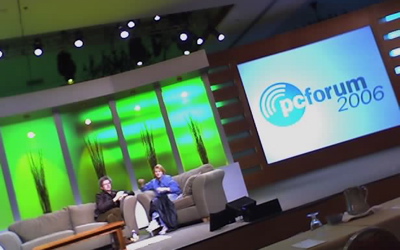I hooked up with Jeremy via email in advance of PC Forum, and asked him if he’d like to do a little interview at the event for my blog, which of course includes lots of readers back in the Twin Cities. And he quickly responded via Blackberry that he’d be happy to. Which I really appreciated, considering how  popular this guy is now with his hot, new startup, Brightcove. Jeremy and his company even had a major feature on page 1A of the Wall Street Journal a couple of weeks ago. So, despite being very busy at PC Forum (including as a panelist — see my previous post on business models), he graciously agreed to spend time chatting with me. What’s more, he had to endure several email attempts by me to hook up with him at the conference (thanks Jeremy!). Hey, it wasn’t easy finding a specific person in a group of 450, especially with things spread out over a large property like LaCosta.
popular this guy is now with his hot, new startup, Brightcove. Jeremy and his company even had a major feature on page 1A of the Wall Street Journal a couple of weeks ago. So, despite being very busy at PC Forum (including as a panelist — see my previous post on business models), he graciously agreed to spend time chatting with me. What’s more, he had to endure several email attempts by me to hook up with him at the conference (thanks Jeremy!). Hey, it wasn’t easy finding a specific person in a group of 450, especially with things spread out over a large property like LaCosta.
It’s hard to believe it will be 10 years this fall that Jeremy and his brother J.J. — just a couple of years out of Macalester College in St. Paul — plus the 25 or so young employees that were then part of Allaire Corp., picked up and moved the company, lock, stock, and barrel, to Cambridge, MA, at their VC’s suggestion. (That was after first considering but passing on Silicon Valley.) Thus began the legendary status of Allaire Corp. around our neck of the woods as the Web 1.0 company that got away — but one that made it very, very big in the process. The company grew to some 450 employees before being acquired for something north of $350 million by Macromedia, where Jeremy then served as CTO for three years (commuting from Boston to San Francisco, which he admits got old).
The move worked well for the company and the two Allaire brothers, Jeremy told me. Both took a strong liking to Cambridge and settled in, got married, and now have two kids each. I asked Jeremy of he ever gets back to visit his parents in Winona, MN. He said not often, but that he sees them regulary at another house they now have in the Boston area.
I also had to ask about the latest big development for J.J. — the acquisition of his startup, Onfolio, by Microsoft. (J.J. was originally scheduled to be at PC Forum and I’d planned to interview him as well, But, alas, he had to cancel due to obligations associated with the acquisition.) Jeremy told me it was a big win for J.J., for a company that he had just self-funded over the past few years. (After Allaire Corp. was acquired, Jeremy said the two didn’t really consider teaming up again in a new business, though they remain close personally — simply because they had different interests.) All six employees of Onfolio, including J.J., are now doing yet another big move — this time to Redmond. How does J.J. feel about that, I asked? “He’s really excited about it,” said Jeremy. First Ray Ozzie leaves Boston behind, now J.J…
Meantime, Jeremy, though he’s not planning to move himself anytime soon, is still quite the traveler, regularly shuttling between Brightcove’s home office in Cambridge and three others already set up: in New York City, Los Angeles, and San Francisco (the cities that most of the major content producers and media companies call home, after all). He told me the company already has 50 employees and is heading to be double that soon.
What’s been the timeline of Brightcove’s short history to date? First, Jeremy told me, he incubated the idea at General Catalyst Partners in Boston for a year or so, after leaving Macromedia. He first presented the company and its planned business model at PC Forum in March 2005. From then through the fall, he and others at the firm began selectively getting the word out to key partners and content providers. That culminated with a presentation at the very well attended insider conference “Web 2.0” (sponsored by O’Reilly), which was held in San Francisco last fall. The company soon had a public debut via a story in the New York Times, which was then followed in February by the major front-page WSJ piece. (I asked Jeremy how he happened to choose his cracker-jack PR firm, SutherlandGold, based in San Francisco, and he said he met them at last year’s PC Forum! I had the opportunity to meet two of those folks at dinner one evening — Susan Cashen, formerly of TiVo, and Amy Janzen — where we shared some good conversation with my colleague Gary Bolles of Conferenza and Microcast Communications.)
So, fast forward, how is Brightcove sitting today? Very well indeed. Jeremy gave me a rundown: it already has 200 of what he calls “broadband channels” or content partners. And, since the company started what it called a “commercial preview” in November, for video producers, it has signed up 450 companies to date. It has 700 of its video “players” deployed, and it has 7000 titles already in its library. It also has an affiliate syndication program, and one client — Reuters — has 1000 affiliates signed up to date. With this Brightcove program for Reuters, any web site or blog can simply fill out a form, put some code into their web page, and become an instant video news broadcaster. (I plan to try it out myself!) Deals with other major media firms include the New York Times, and yet others are still in the works, including CBS (as touched on in the WSJ article) — though Jeremy had no new announcements he could tell me about quite yet.
My final question for Jeremy was this: What’s it like having Barry Diller on your board? “Oh, it’s great,” he said. “He’s a remarkably intelligent guy, with a strong strategic mind for online businesses. And he’s one of the most connected people on the planet.” Jeremy said it’s very rare for Diller’s firm, IAC/InterActiveCorp, to make minority investments, which they did on the case of Brightcove. They tend to only acquire companies outright. Diller sits on Brightcove’s board, which is also quite an achievement for the startup, since he only serves on two other boards: The Washington Post and Coca-Cola.
I closed by asking Jeremy about his management team, which he said is “tremendous.” It even includes one colleague from the early days of Allaire Corp., who was also a friend of his at Macalester College in St. Paul: Adam Berrey, now Brightcove’s VP of Marketing. Where was Jeremy off to next? San Francisco, he said, to keynote at the “VON” conference. And he was going to spend some time at his offices there as well, in addition to catching up with a guy I’ve since met who was employee #4 at Allaire Corp., Ben Cantlon. (Ben recently relocated back to Minneapolis but was visiting SF this week.)
Thanks for the interview, Jeremy, and best of luck as you continue disrupting the video distribution business!
Tag: PCforum06
Tag: PCforum
 advantage of that service and created a swicki for my own blog, which I set up and took live in about 15 minutes. You can see it at the right, complete with what’s called the “buzz cloud” within the widget itself.] In its announcement, Eurekster said publishers are invited to create their own swickis, free of charge, with the Eurekster SwickiBuilder here, and “can opt to share in the search-related advertising revenue, a feature that will be available soon.” Harder told me some 5000 blogs have signed up so far and set up a swicki.
advantage of that service and created a swicki for my own blog, which I set up and took live in about 15 minutes. You can see it at the right, complete with what’s called the “buzz cloud” within the widget itself.] In its announcement, Eurekster said publishers are invited to create their own swickis, free of charge, with the Eurekster SwickiBuilder here, and “can opt to share in the search-related advertising revenue, a feature that will be available soon.” Harder told me some 5000 blogs have signed up so far and set up a swicki. on Monday afternoon, CEO Gilmour spoke of the ready market for Illumio: “There will be something like 50 million desktop search engines by the end of 2006, and there will be zero PCs without desktop search after the next OS generation.” He said his company’s Illumio technology now supports Google and MSN desktop search, and others will follow. It searches files, documents, email, contacts, favorites, browser cache, appointments, and more. He allowed, however, that a problem with desktop search is privacy. “The market is hyper-sensitive about that,” and he said his company works hard on it.
on Monday afternoon, CEO Gilmour spoke of the ready market for Illumio: “There will be something like 50 million desktop search engines by the end of 2006, and there will be zero PCs without desktop search after the next OS generation.” He said his company’s Illumio technology now supports Google and MSN desktop search, and others will follow. It searches files, documents, email, contacts, favorites, browser cache, appointments, and more. He allowed, however, that a problem with desktop search is privacy. “The market is hyper-sensitive about that,” and he said his company works hard on it. wore the sweatshirt from that event in honor of the occasion. A lot has certainly changed in those 11 years, for Sun and everyone else. In recent years, Bill made the move to VC-land and joined Kleiner Perkins — where his former Sun colleague, Vinod Khosla, has been a partner for many years.
wore the sweatshirt from that event in honor of the occasion. A lot has certainly changed in those 11 years, for Sun and everyone else. In recent years, Bill made the move to VC-land and joined Kleiner Perkins — where his former Sun colleague, Vinod Khosla, has been a partner for many years. popular this guy is now with his hot, new startup,
popular this guy is now with his hot, new startup,  were quite good, too. Esther Dyson kicked things off by referring to some pundit’s remark that search was as good as it’s going to get. “I don’t agree,” said Jeff Weiner. “Search is the great democratizer,” and he says lots more good stuff is coming — “like voting on search results and other Web 2.0 stuff.” But he also made an excellent point: that for a company to really take advantage of search, it needs a smart webmaster (read: for SEO and SEM), or to “be wealthy enough to hire that out.” As an example of something new, Weiner also offered up “Yahoo Answers,” a service whereby anyone can ask a question and anyone can answer. It’s essentially a knowledge search service, he said, which had a December beta launch.
were quite good, too. Esther Dyson kicked things off by referring to some pundit’s remark that search was as good as it’s going to get. “I don’t agree,” said Jeff Weiner. “Search is the great democratizer,” and he says lots more good stuff is coming — “like voting on search results and other Web 2.0 stuff.” But he also made an excellent point: that for a company to really take advantage of search, it needs a smart webmaster (read: for SEO and SEM), or to “be wealthy enough to hire that out.” As an example of something new, Weiner also offered up “Yahoo Answers,” a service whereby anyone can ask a question and anyone can answer. It’s essentially a knowledge search service, he said, which had a December beta launch. 
Recent Comments